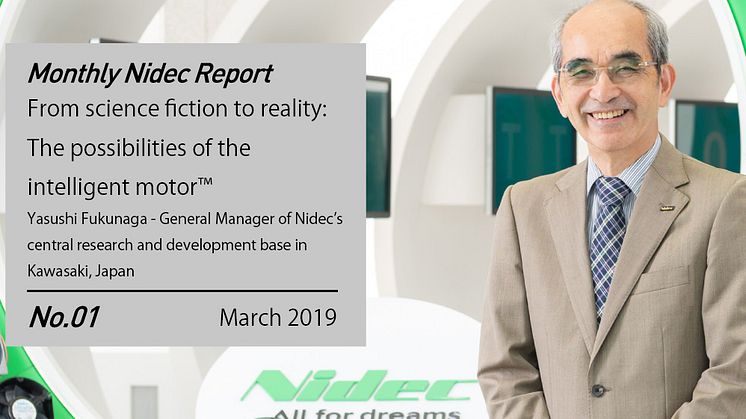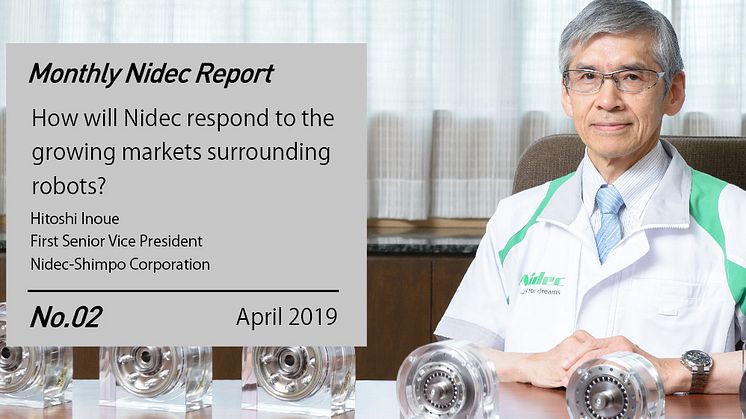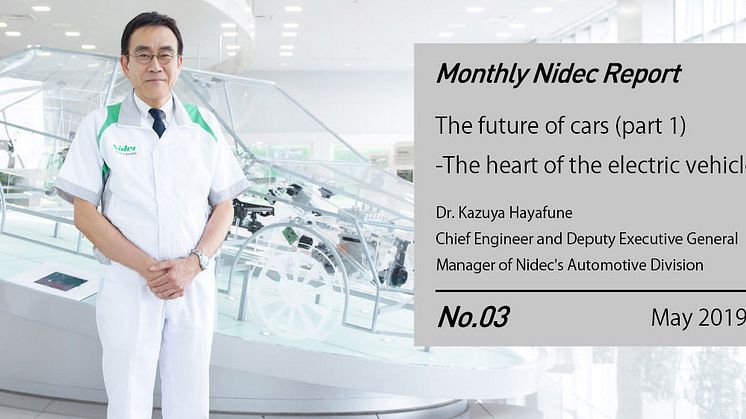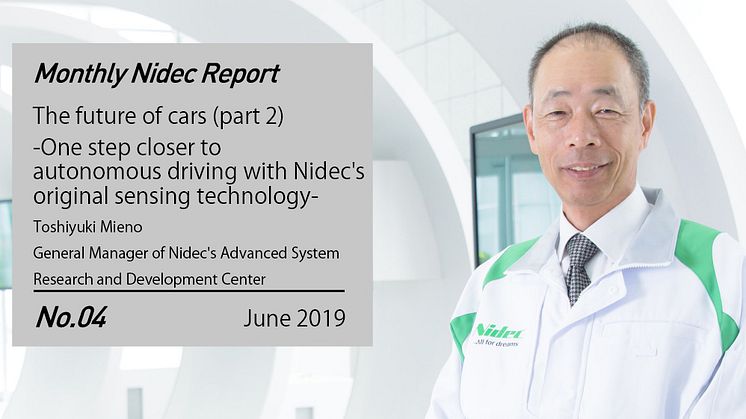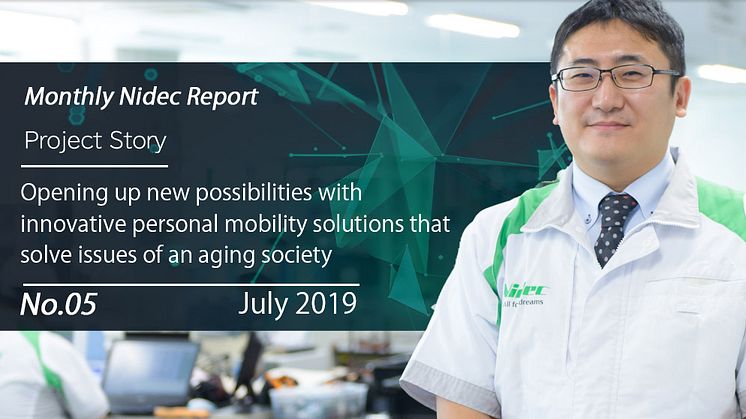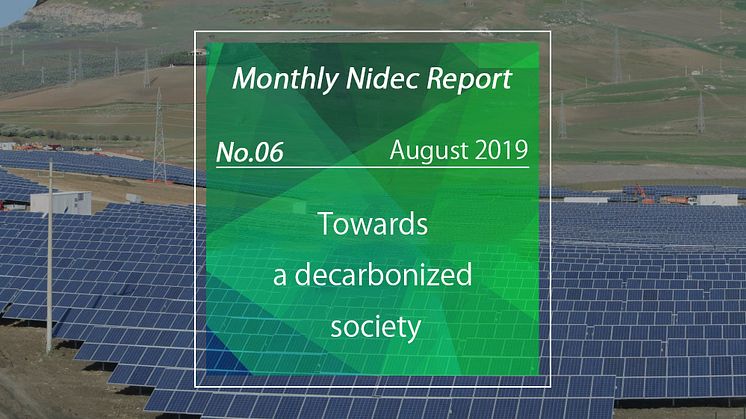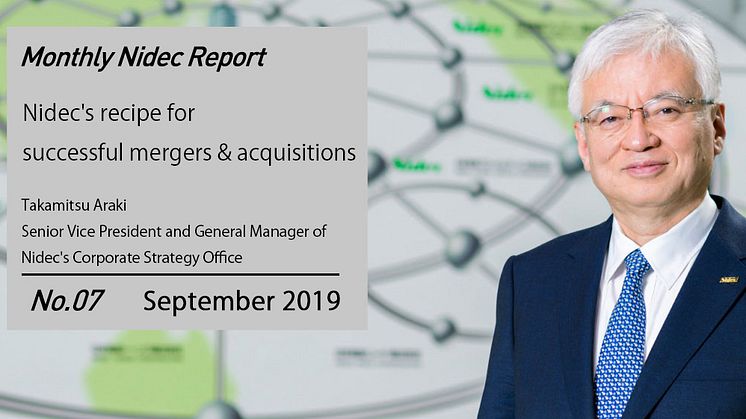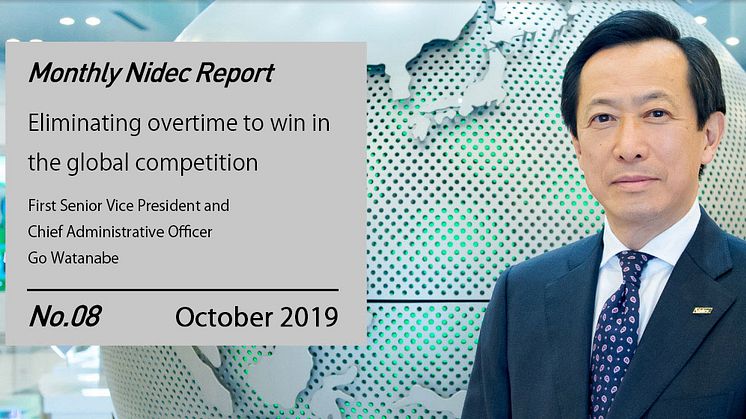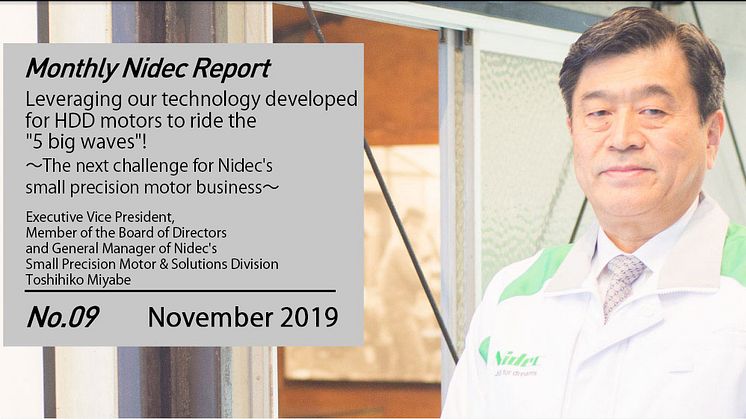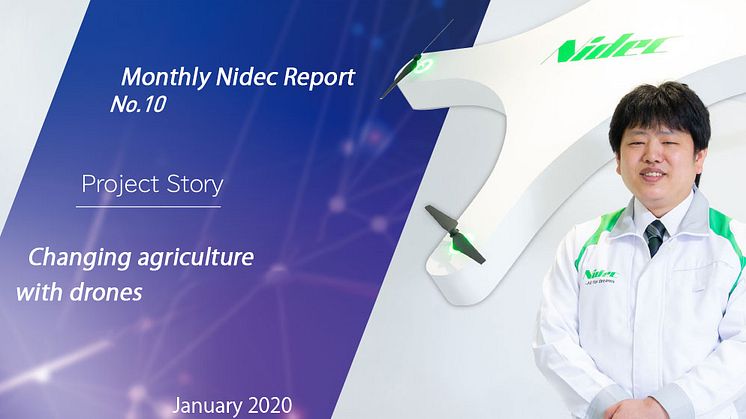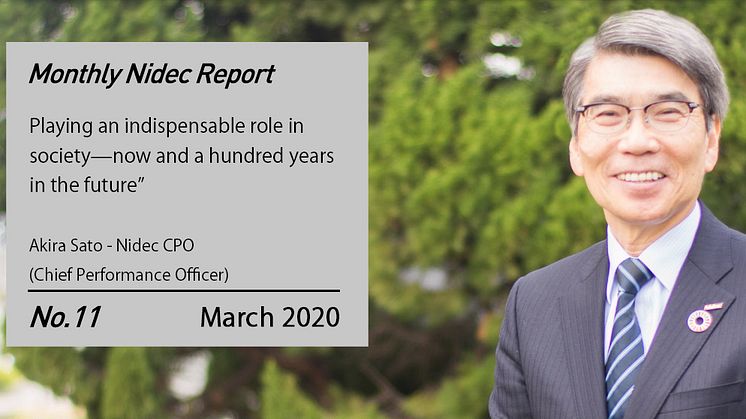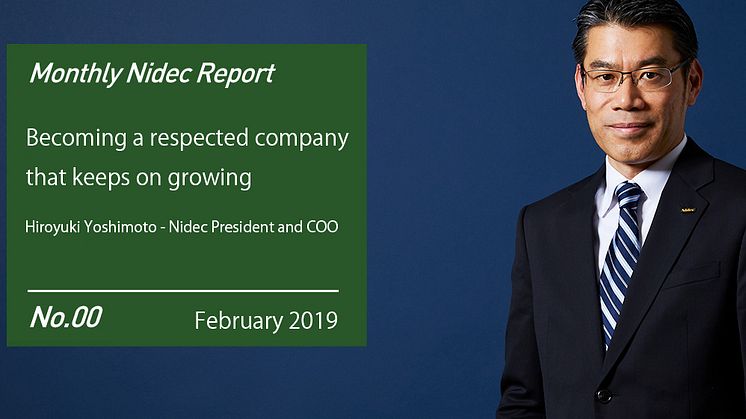
Blog post -
Monthly Nidec Report - Hiroyuki Yoshimoto (President and COO)
The new president of Nidec, appointed in June 2018, talks about his leadership vision, plans for the future and what he has learned through his diverse career that started at a general trading company.
An entrepreneurial spirit forged through baptism by fire
- Did you have your eyes set on becoming president of a company from the outset?
Not necessarily. In the past, I felt like I was more cut out to be second in command—a strategic adviser behind the scenes, if you will. In my childhood, I was often the person supporting the leader. For example I would be the class vice president rather than the president. However, this slowly changed through the course of my career as I went out into the world and experienced many different projects.
- How did your experiences shape you?
Chronologically speaking, things started when I graduated university and joined the leading general trading company Nissho Iwai Corporation (currently known as Sojitz Corporation). The reason why I decided to start my career at a trading firm was quite simple actually: I wanted to work with people all around the world on the global stage. I have always been a globally oriented person; in high school, I even considered becoming a diplomat or a commercial airline pilot flying around the world.
When I joined Nissho Iwai, they very much had a pull-yourself-up-by-your-bootstraps approach to learning. The prevalent way of thinking at the time can be summed up as “when there is a will, there is a way.” I was assigned to the automotive field and my responsibilities included negotiating with automakers, preparing various documents, developing new trade channels abroad and building our network of sales representatives, among other things. I was expected to do all of these things by myself, while creating new business opportunities at the same time. It was not uncommon to be responsible for 5 or 6 countries at the same time and before a single year had passed since I started working, I was sent to Iran on a long-term business trip and told not to return before I had fulfilled the business development goals I had been tasked with (Hiroyuki laughed slightly as he recalled the situation [editor’s note]). At the time, I didn't yet have much experience speaking English and, on top of that, the locals all spoke Persian so I had a hard time communicating. I was unfamiliar with the food and no one would save me if I contracted food poisoning and got seriously ill. It was nothing short of a survival test but this environment helped me grow. My language skills grew as well as I would learn new words on a survival basis.
The twelve years that I spent working as a trading company employee were instrumental in awakening and nurturing my entrepreneurial spirit. Many who had joined before me would leave and become independent and they would be praised and admired as heroes by their former peers—Nissho Iwai was a bit of an unusual company in that sense. I think these experiences influenced me and shaped my foundation.

Yoshimoto’s time at General Electric and the excitement of business revitalization
- What made you take the decision to join General Electric in 2003?
The business environment surrounding trading companies started taking a turn for the worse and at the same time I also felt a desire to be involved in the manufacturing industry.
My impression of GE was that of a truly amazing company. I read the books of Jack Welch, the charismatic former CEO of GE, when I studied corporate strategy and marketing theory as an MBA student at Carnegie Mellon University in 2002. GE was famed as a company that aimed high and kept on growing through the use of innovative management methods such as the "Six Sigma" techniques for quality control. It was also known as a company with high expectations on its employees.
After joining GE, I discovered that the company had its own strong and rich corporate culture, similar in intensity to the strict age hierarchy associated with Japanese trading companies albeit with a different character. Being part of GE really helped me grow my leadership abilities. At GE, as you climb the corporate ladder your responsibilities grow exponentially. The importance of taking initiative without being afraid of risks in order to help the company grow was implanted in my mind as I worked at GE and gained experience through a variety of different projects.
- Out of all the different projects you experienced during your four and a half years at GE, which one left the greatest impression on you?
There was a project that involved turning around a certain struggling finance business that GE had launched in Japan. When revitalizing a business, you have to practice self-denial to some degree and accept that some of the things you have been doing need to change. In this particular case, it proved necessary to add some members to the project who had not been directly involved with the business before in order to be able to take these steps that can sometimes be very difficult. When I heard about this project I thought it sounded interesting and I volunteered and was selected as a member even though I didn't necessarily have much prior knowledge about the circumstances of the business. This became my first experience working outside of the automotive industry. It was also my first time being involved in a business-to-consumer business. We comprehensively overhauled all aspects of the business. TV commercials and branding, business processes, the interface with our customers—no areas were left untouched. As a result, the company changed dramatically and was able to recover completely in just a single year.
It was an exceptionally tough project, but I found it fulfilling and it also gave me a considerable feeling of accomplishment. I wouldn't say that this was the experience that awakened my interest in business management, but it certainly opened my eyes to just how enjoyable it can be to turn around struggling businesses by displaying leadership, uniting the employees so that they all face the same direction and then leading them forward toward the overall goals of the company. I felt a desire to keep pursuing similar projects.
 If I were to summarize my personality in a single word, I would say that I am impatient. When I was a child, my mother would sometimes lament that I was unmannered and self-willed (Hiroyuki said while smiling [editor’s note]). I wouldn't listen to what other people said and I would often act solely based on my own subjective opinions, she said, and would often wish that I could be more peaceful and cooperative. Some of these traits remain a part of my personality, but, truth to be told, I have come to find that lack of patience isn't necessarily always a disadvantage when it comes to business. I have realized that by channeling my lack of patience into speed I can turn it into a useful weapon. One of the reasons why I felt that Nidec was a good match for me was the importance the company places on speed. Working at other companies, I would feel both irritation and a feeling of lonely emptiness as people around me—both above and below me in the hierarchy—would be slow to take action. At Nidec, on the other hand, I feel at home since people are quick to act. If I were to summarize my personality in a single word, I would say that I am impatient. When I was a child, my mother would sometimes lament that I was unmannered and self-willed (Hiroyuki said while smiling [editor’s note]). I wouldn't listen to what other people said and I would often act solely based on my own subjective opinions, she said, and would often wish that I could be more peaceful and cooperative. Some of these traits remain a part of my personality, but, truth to be told, I have come to find that lack of patience isn't necessarily always a disadvantage when it comes to business. I have realized that by channeling my lack of patience into speed I can turn it into a useful weapon. One of the reasons why I felt that Nidec was a good match for me was the importance the company places on speed. Working at other companies, I would feel both irritation and a feeling of lonely emptiness as people around me—both above and below me in the hierarchy—would be slow to take action. At Nidec, on the other hand, I feel at home since people are quick to act.
|

Drawn in by the scale of the founder's vision
- Tell us about the reason why you ended up leaving GE for a company in the Nissan group (Calsonic Kansei). Were they looking for a person with experience turning around struggling companies?
Well, that was part of the reason. I was attached to GE and I had every intention of keeping on working energetically at the company, but at the same time I wanted to work at a Japanese company again at some time in the future and I felt a desire to contribute to rebuilding Japan's manufacturing industry that had lost its former glory. By chance, I ended up receiving an interesting offer that satisfied all of my requirements—a Japanese manufacturing company in the automotive industry looking to revitalize their business—so I ended up taking the offer.
After returning to Japan and spending a couple of years at Calsonic Kansei rebuilding the business I was summoned to Nissan's Japanese headquarter and tasked with the mission of managing the company's Thailand branch. This time around, I would create new growth rather than rebuild a declining business. Nissan's Thailand branch is a rather sizable operation that handles both domestic sales and production of automobiles for exportation and they needed a business leader from Nissan's home country Japan who could preside over the entire operation. That became my mission and so I ended up moving to Thailand.
- So you were living in Thailand right up until when you joined Nidec?
That’s correct. I became part of Nidec approximately two years after I was made head of Nissan’s Thailand branch. Things had just started to pick up and run smoothly. At the time, I didn't have any business connections, past or current, with Nidec, but I grew up in Kyoto where their head office is located and I felt a familiarity and a connection with the company. During my days at Nissho Iwai I made it a pastime to read books by business leaders and I had read all of Nagamori's—the founder and CEO of Nidec—books. They made a great impression on me and his achievements and his way of thinking struck a chord with me. One day, I received an invitation from him through an acquaintance. "Why don't we meet and talk a bit some time when you return to Japan on a business trip?" he said. As you can imagine, I was tremendously excited; a charismatic business leader who I had only known though his bestselling books had suddenly approached me and invited me to come meet and talk with him.
With that being said, I didn't have any intentions to switch jobs at time. But, as I met with Nagamori and talked to him, I ended up changing my mind. Nagamori's passion for business, his ambition to turn his company to the number one business in the world and the pure scale of his vision—these things that cannot be boiled down to pure logic and reasoning resonated with me and made me take the decision to join his company. I imagined that he would be strict and stern, but when I met him in person he struck me as a very broad-minded person with a large-scale vision.

Nidec Tosok, a company in the Nidec group that manufactures original products including automotive parts and measuring equipment
Identifying problems quickly with the "San Gen Shugi" method
- From what I understand, you joined Nidec in March 2015 and was charged with improving the profitability of the subsidiary Nidec Tosok the following month in April.
Tosok wasn't running at a loss, but their profit margin didn't meet Nidec's standards and they were in need of an aggressive overhaul to improve their profitability. Their business is centered on automotive parts so I was in my element; I could understand their products well and leverage my existing connections. In a way, the conditions were ideal for me.
- According to Nagamori, your mission to turn around Tosok also served as a way to assess your abilities as his potential successor. Were you aware of this at the time?
To be honest, no. The thought didn't cross my mind. I poured all of my energy into getting Tosok on track and I didn't have time to think about anything else. I was completely focused on improving the company’s profitability.
Actually, the recipe for turning around a struggling company is largely independent on what kind of products the company manufactures. The first step is to learn about the issues the company is facing. A good way to do so is to utilize the "San Gen Shugi" method: analyzing the company from the three perspectives of location—the place where the action is—, the actual product and the reality of the situation. You start by visiting the production floor, sales offices and other locations where the actual work is being done. You talk to the employees to gain a perspective of the facts through firsthand accounts and then you acquaint yourself with the equipment, goods, materials—the actual items and tools that are part of the business. By doing this methodically and consistently, you can identify the problems in the organization in a short amount of time. Perhaps the directors are being inconsistent in how they run operations, or maybe the management vision isn't solid or the company fails to properly uphold manufacturing standards without noticing it. I usually spend about two weeks learning about the issues, a month or so formulating and conceptualizing them, and then another month creating, and putting into practice, a detailed plan for rebuilding the business step-by-step.
- The time frame seems very short compared to typical methods.
I believe this is the level of speed that is required. Perhaps this is related to my impatient personality, but I think this speediness is one of Nidec's greatest strengths.
 This is just my personal observation, but I feel like I have much in common with Nagamori when it comes to being impatient and attentive to details. When I started the Tosok project Nagamori told me to take my time and tackle the problems carefully and deliberately but after only a day had passed my phone was ringing and he started asking me about the progress and if I had figured things out (Hiroyuki laughed as he recalled the event [editor’s note]). That's the kind of speediness you see at Nidec. This is just my personal observation, but I feel like I have much in common with Nagamori when it comes to being impatient and attentive to details. When I started the Tosok project Nagamori told me to take my time and tackle the problems carefully and deliberately but after only a day had passed my phone was ringing and he started asking me about the progress and if I had figured things out (Hiroyuki laughed as he recalled the event [editor’s note]). That's the kind of speediness you see at Nidec. In terms of differences, I would say Nagamori's ability to start from zero and create business out of nothing constitutes a big difference between us. I have been called a "business reconstruction specialist" in newspaper articles before and to some degree I agree with this description. I derive more enjoyment out of, and feel more at home, getting a struggling business back on track than creating something new out of nothing. Another difference is in our capacity and caliber as humans. Nagamori is truly a person of high caliber. I will have to work on building up this part of my personality in the future. |

"It's a thorny path, but that just makes it all the more worthwhile"
- Rumor has it that Nagamori was surprised at your immediate affirmative response when he suggested that you take on the responsibilities of becoming next in line for the presidency. Did you anticipate to some extent that he was going to present you with that opportunity?
Well, I would be lying if I said that I hadn't considered the possibility. But, I didn’t really think that it was more than a distant future possibility. I had my suspicions though. He would confide in me that he found the repeated overseas business trips exhausting for example. This ties in with his personal magnetism and his way with people; if someone suggests that their bodily strength is not what it used to be and asks you to take on a part of their responsibilities there is no way you can say no, right? That's how it all went. It's not like he just asked me to become president all of a sudden out of the blue and I said yes. Sure, I was a bit surprised when he approached me with the subject, but it is true that I accepted right away.
Being the president of a company like Nidec is a heavy responsibility with its own share of insecurity and pressure, but more than that I felt enthusiasm. This is something that harks back to my younger days; for some reason, when there is a fork in the road and I stand before the choice of keeping on doing the same thing while producing results at a comfortable pace, or walking a thorny road filled with risks and new experiences, I always end up taking the latter option. It's strange even for myself, but I feel more motivated when taking on challenges and if things work out it's more enjoyable as well. I suppose I don't have any intentions of leading a stable life in the first place.

Focus on global post-merger integration
- What is your impression of Nidec as a company group?
I understand that many view Nidec as a very "Japanese" company, but in my view this is far from the truth. I think that Nidec is very much a global company. Nagamori's management philosophy is marked by a universality and applies to companies all around the world. I think Nidec is a company with a global standard, not unlike GE's "GE Values" or Ritz-Carlton's "Credo," that can influence and move people all around the world. On top of that, the company has retained the nimbleness and speediness that so many other companies lose when they grow past their small and medium-sized enterprise phase. The difference in terms of speed when compared to typical companies is a factor of three. It's a nimble global company with a yearly turnover of over one trillion Japanese yen (USD 9B, EUR 8B).
- What kind of changes do you want to make to the company group now that you are the new president?
First of all, I do not want to make any changes to the core strengths of Nidec. On the contrary, I intend to place even more emphasis on our strong points and make sure that these values reach all parts of the organization—including our many companies and business units outside of Japan. The responsibilities that Nagamori, the chairman, has entrusted in me are focused on the post-merger integration of overseas business operations. Travelling all around the world and meeting and talking to people at our many factories and offices can be tiring and use up a lot of energy, but this is my field of expertise so I want to commit myself to this mission. As I mentioned earlier, uniting people who are facing different directions brings great joy to me. Doing this while meeting and talking to Americans and Europeans, for example, with different views and values makes it all the more fulfilling when our thoughts align.
Of course, this all takes a lot of time. We have something in the region of 300 factories around the world, just speaking in terms of production facilities. But, I am convinced that all of the employees are standing on common ground—in the end I think we all share the wish to improve and grow our company and make it better. It's just a matter of bringing these feelings out by visiting the factories, one by one, joining the employees on the floor and talking to them one at a time. As you do these things, you start trusting each other and feeling like you can work together. This is where I will start.

- Finally, what are your plans for the future of Nidec?
One thing that I want to focus on, is to keep growing the company without end. Our target for FY 2030 is to reach 10 trillion Japanese yen in sales. It's a very ambitious goal, but if you look at all of the different sectors that are seeing a steady trend of electrification, you realize that it is far from an impossible one. And after we reach this goal, we will keep on growing still. Internally, we often use the phrase "a company that keeps on growing beyond a hundred years."
Another thing that I want to work towards is striving to be a respected company. My fondest memory from my days at GE was the time when we were selected as the world's most respected company. A respected company makes children of the employees proud that their parents are part of it. People want to join the company and parents want their children to work there as well. That's the kind of company I want Nidec to be. Our company actually contributes quite a bit to society, but unfortunately we largely remain unknown. I want us to be more visible in society.
A company that makes indispensable products and services and delivers them to all parts of the world. A company that contributes to society and creates employment opportunities in various regions around the world while turning a profit. And, last but not least, a company that not only Japanese people but also people all around the world can look at and say "that's a good company." That's what I want to strive for.
 My hobbies outside of working include swimming. I don't play golf at all and, although I used to play tennis before, I don't do it anymore. Whenever I can find some time away from work I go swimming. As long as you have swimming wear and access to a pool you can go swimming and it's also an excellent way to burn calories as the load on your body is 8 times greater in the water compared to when you're on land. It’s perfect for an impatient person like myself. I like to swim crawl for an hour or so without taking any breaks. If I'm swimming in a 25 meter pool I will swim 50 round-trip laps for a total of 2500 meter. When I'm on my second lap I inevitably start thinking about reasons to stop swimming, like all of the emails I need to send, or what would happen if I got a cold, for instance. But, after a while, I get a surge of adrenaline and suddenly I start thinking that I will be unable to meet my monthly business goals if I give up before I swim 50 laps (Hiroyuki laughs [editor’s note]). You get really tired after swimming 50 laps and you lose quite a bit of weight as well—2 kilograms or so. After swimming I feel refreshed and ready to tackle work again. As a result, my productivity increases. |
